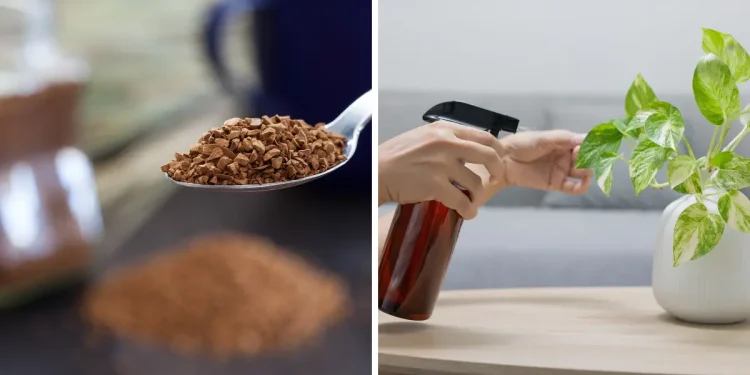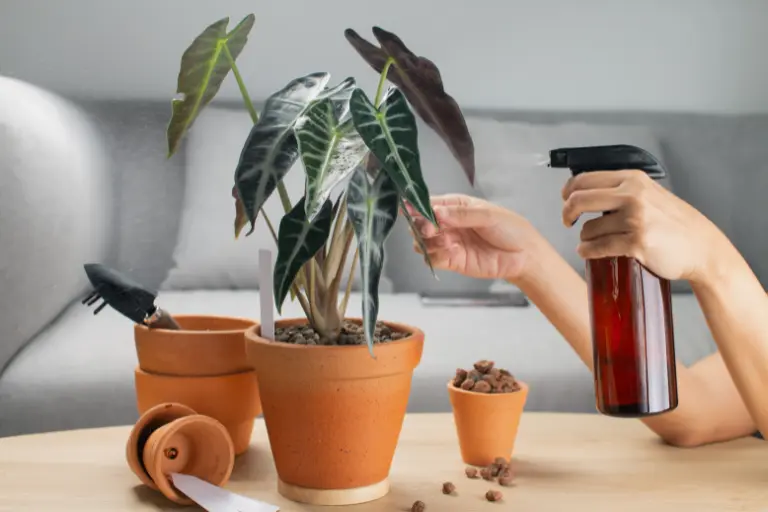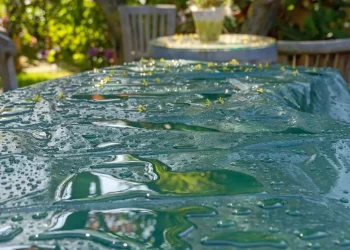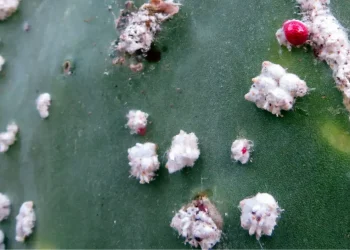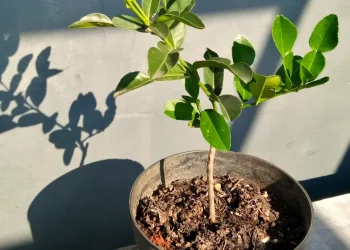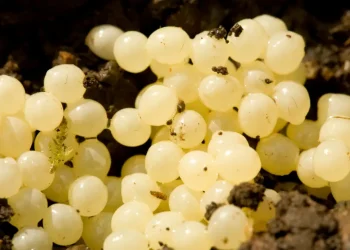Coffee grounds can make this miracle fertilizer that can make the soil more acidic and add essential nutrients such as nitrogen, potassium, and magnesium. Coffee lovers will probably tell you instant coffee is not real coffee. But will a plant tell the difference, or is instant coffee good for plants?
Without diving too deep into the dark liquid, instant coffee is made from real coffee beans by extracting the soluble contents of it. But most of the antioxidants are preserved. If you make sure to choose instant coffee without vanilla or any other of your favorite flavoring and it’s perfectly suitable for plants, too, and makes an excellent solution for nutrient deficiencies in plants.
In this article, we’ll take a look at all the benefits instant coffee brings for garden and potted plants and how those compare to using regular coffee grounds for plants. I will also give you specific conditions under which instant coffee is a great fertilizer. Make yourself a cup of coffee, and let’s dive in!
Is Instant Coffee Good for Plants?
When it comes to using instant coffee in your garden, it might seem like an unconventional approach, but there are a few benefits worth considering. It won’t be as efficient or as stable as traditional fertilizers, but it’s a great way to save a bit of money.
Firstly, instant coffee is high in nitrogen, a crucial nutrient for plant growth and development. Nitrogen plays a vital role in promoting lush foliage and encouraging overall plant health.
Another important property of instant coffee is its acidity. Coffee, in general, is fairly acidic, with a pH of around 5.
The pH of the soil is not just a number. Soil pH limits the availability of certain nutrients. In slightly acidic soils, minerals like iron, manganese, and aluminum are easily accessible to plants, ready to be absorbed. But when we flip the scale and the pH shifts towards the alkaline side, these minerals are essentially locked away, and others become more available, like calcium or magnesium.
But plants need all nutrients. That’s why most plants do best in slightly acidic soil around 6.2 and 6.8 pH. If the pH of the soil is too alkaline, you can use coffee to make it more acidic.
Additionally, the strong aroma of coffee can act as a natural deterrent for certain pests, such as slugs and snails, which are known to nibble on leaves and damage plants.
Benefits of Instant Coffee for Plants
- Contains essential nutrients
- Can make soil more acidic
- Natural pest repellent
Can you use Instant Coffee for Houseplants?
Houseplants usually have different requirements than plants in your garden, and they are more sensitive to changes or unsuitable environments.
The good news is that similar to its benefits for outdoor plants, instant coffee can also play a role in caring for your indoor companions. The bad news is that since you never really know what the exact composition of your coffee is, it can easily take a turn for the worse. You can easily burn your plants with too much nitrogen, or all other essential nutrients will be unavailable if the soil turns out to be too acidic.
So which plants should you fertilize with instant coffee?
Which Plants to Fertilize with Instant Coffee?
The main use of coffee for plants is to make the soil more acidic. It does contain essential nutrients, but that doesn’t make coffee gardener’s first choice for nutrient deficiencies. When considering the use of instant coffee as a fertilizer, it’s wise to focus on specific plant types that could potentially benefit the most. Acid-loving plants, such as azaleas, rhododendrons, and camellias, thrive in slightly acidic soils, making them excellent candidates.
Since these plants grow in acidic soil, making the soil even more acidic than recommended won’t cause much harm.
Secondly, you can take advantage of how nitrogen-rich coffee is. It may provide a boost to leafy greens like lettuce, spinach, and kale, contributing to their growth. Herbs such as basil, mint, and parsley, which often rely on healthy foliage for optimal flavor and aroma, might also respond positively to the nutrient content found in instant coffee.
However, for these types of plants, it’s important to approach with caution and moderation. For instance, spinach does the best in neutral or more alkaline soil, up to 8 pH, and introducing coffee with a pH of about 5 to the soil can throw off the balance.
The rule here is simple. Before using coffee in your garden as a fertilizer, search whether your plant likes an acidic environment or not and start slowly, observing how your plants respond to the addition of instant coffee.
How to use Instant Coffee for Plants
When it comes to using instant coffee for your plants, there are a few methods you can try. But it all starts by brewing a cup of instant coffee as you usually would. You’ll need just a bit of it, so enjoy your beverage and allow the leftover coffee to cool to room temperature.
Next, dilute the cooled coffee with water. For this specific usage, we’re aiming for a weak solution. I would advise using about 1:1.5 mix – mixing 1 cup of brewed coffee with 1.5 cups of plain water.
The diluted coffee solution can then be applied to your plants. You can either use it to water them as you would normally do.
Your second option is to spray it on your plants. This method allows the plant to absorb some of the coffee’s nutrients directly through its leaves. But I would recommend using this method rarely, as spraying too much coffee could potentially clog the stomata of the leaves and hinder the plant’s ability to respire.
Conclusion
Even though it may sound weird at first, yes, even instant coffee is good for plants. Using coffee as a fertilizer comes with two big benefits. Firstly, it’s nitrogen-rich, providing this essential mineral to the plant. And let’s not forget that coffee, whether it’s coffee grounds or instant coffee, is quite acidic – around 5 pH, and can help bring down the acidity of the soil. But having all the nutrients available would be pointless if you just washed away the majority of them. That’s when moisture retention comes into play. One way to retain more moisture in your garden and pots is to add moss. But there’s more to it so make sure to check out my article…

